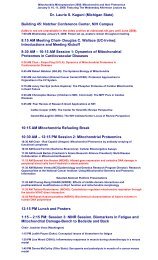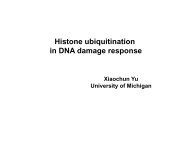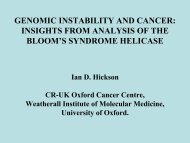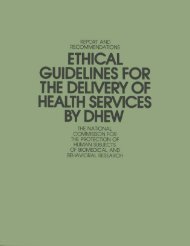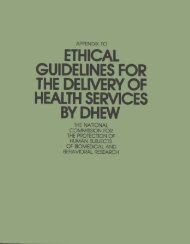RESEARCH ON THE FETUS - National Institutes of Health
RESEARCH ON THE FETUS - National Institutes of Health
RESEARCH ON THE FETUS - National Institutes of Health
Create successful ePaper yourself
Turn your PDF publications into a flip-book with our unique Google optimized e-Paper software.
as an additional safeguard; this issue will be thoroughly explored in connection<br />
with the Commission's review <strong>of</strong> the consent process. Most <strong>of</strong> the Commissioners<br />
agree that in view <strong>of</strong> the father's possible responsibility for the child, should<br />
it be brought to term, the objection <strong>of</strong> the father should be sufficient to veto.<br />
Several Commissioners, however, hold that for nontherapeutic research directed<br />
toward the pregnant woman, the woman's consent alone should be sufficient and<br />
the father should have no veto.<br />
4. Research on the fetus during the abortion procedure or on the<br />
nonviable fetus ex utero raises sensitive problems because such a fetus must be<br />
considered a dying subject. By definition, therefore, the research is nontherapeutic<br />
in that the benefits will not accrue to the subject. Moreover, the<br />
question <strong>of</strong> consent is complicated because <strong>of</strong> the special vulnerability <strong>of</strong> the<br />
dying subject.<br />
The Commission considers that the status <strong>of</strong> the fetus as dying alters the<br />
situation in two ways. First, the question <strong>of</strong> risk becomes less relevant, since<br />
the dying fetus cannot be "harmed" in the sense <strong>of</strong> "injured for life." Once the<br />
abortion procedure has begun, or after it is completed, there is no chance <strong>of</strong> a<br />
change <strong>of</strong> mind on the woman's part which will result in a living, injured subject.<br />
Second, however, while questions <strong>of</strong> risk become less relevant, considerations <strong>of</strong><br />
respect for the dignity <strong>of</strong> the fetus continue to be <strong>of</strong> paramount importance, and<br />
require that the fetus be treated with the respect due to dying subjects. While<br />
dying subjects may not be "harmed" in the sense <strong>of</strong> "injured for life," issues<br />
<strong>of</strong> violation <strong>of</strong> integrity are nonetheless central. The Commission concludes,<br />
therefore, that out <strong>of</strong> respect for the dying subjects, no nontherapeutic interventions<br />
are permissible which would alter the duration <strong>of</strong> life <strong>of</strong> the nonviable<br />
fetus ex utero.<br />
Additional protection is provided by requiring that no significant changes<br />
are made in the abortion procedure strictly for purposes <strong>of</strong> research. The Commission<br />
was divided on the question <strong>of</strong> whether a woman has a right to accept<br />
modifications in the timing or method <strong>of</strong> the abortion procedure in the interest<br />
<strong>of</strong> research, and whether the investigator could ethically request her to do so.<br />
Some Commission members desired that neither the research nor the investigator<br />
in any way influence the abortion procedure; others felt that modifications in<br />
68



